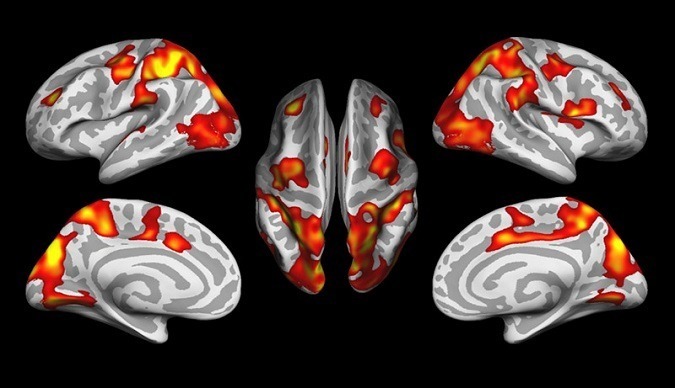Study finds training-induced neuroplasticity even in patients with chronic traumatic brain injury (TBI)

Images show prefrontal connectivity patterns after cognitive training in individuals who suffered traumatic brain injury. Kihwan Han et al (2018)
_____
Cognitive training reduces depression, rebuilds injured brain structure & connectivity after traumatic brain injury (UT-Dallas release):
“New research from the Center for BrainHealth at The University of Texas at Dallas shows that certain cognitive training exercises can help reduce depression and improve brain health in individuals years after they have suffered a traumatic brain injury (TBI).
The recent study…revealed significant reductions in the severity of depressive symptoms, increased ability to regulate emotions, increases in cortical thickness and recovery from abnormal neural network connectivity after cognitive training.
“To our knowledge, this is the first study to report brain change associated with reduced depression symptoms after cognitive training,” said Dr. Kihwan Han, a research scientist at the Center for BrainHealth who works in the lab of Dr. Daniel Krawczyk. Han is the lead author of the study… “Identifying what changes are happening in the brain when interventions successfully reduce depressive symptoms could allow us to create more effective, pharmaceutical-free approaches to help alleviate depression in people who experience chronic traumatic brain injury symptoms,” said study author Dr. Sandra Bond Chapman, founder and chief director of the Center for BrainHealth.
The Study:
Strategy-based reasoning training modulates cortical thickness and resting?state functional connectivity in adults with chronic traumatic brain injury (Brain and Behavior). From the abstract:
- Introduction: Prior studies have demonstrated training?induced changes in the healthy adult brain. Yet, it remains unclear how the injured brain responds to cognitive training months?to?years after injury.
- Methods: Sixty individuals with chronic traumatic brain injury (TBI) were randomized into either strategy?based (N = 31) or knowledge?based (N = 29) training for 8 weeks. We measured cortical thickness and resting?state functional connectivity (rsFC) before training, immediately posttraining, and 3 months posttraining.
- Results: Relative to the knowledge?based training group, the cortical thickness of the strategy?based training group showed diverse temporal patterns of changes over multiple brain regions … Analyses of brain–behavior relationships revealed that improvement in trail?making scores were associated with training?induced changes in cortical thickness within the strategy?based training group.
- Conclusions: These findings suggest that training?induced brain plasticity continues through chronic phases of TBI and that brain connectivity and cortical thickness may serve as markers of plasticity.
The Study in Context:
- How learning changes your brain
- Can brain training work? Yes, if it meets these 5 conditions
- What are cognitive abilities and how to boost them?
- Solving the Brain Fitness Puzzle Is the Key to Self-Empowered Aging
- 20 Must-Know Facts to Harness Neuroplasticity and Improve Brain Health


